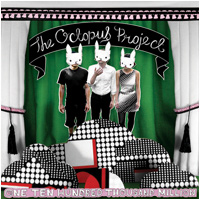The Octopus Project - One Ten Hundred Thousand Million
 I've been listening to The Octopus Project's One Ten Hundred Thousand Million (Peak-a-Book Records; 2005) all day. I originally got the CD about six months ago, but haven't really picked it up until today. It's been a great album to walk to, and I think there are several reasons why I like it so much. The band (at least on this one album) is similar in approach to The Books, but very different in execution. Where The Books try to make their computer-stitched-together songs still sound fairly traditional (this is in now way meant as a jab, I think they're use of dialogue as well as other more modern musical tools is incredible, but they do have less of a rough "edge") The Octopus Project is willing to allow there music to move farther away from traditional acoustic instruments, and towards a more digitally produced sound.
I've been listening to The Octopus Project's One Ten Hundred Thousand Million (Peak-a-Book Records; 2005) all day. I originally got the CD about six months ago, but haven't really picked it up until today. It's been a great album to walk to, and I think there are several reasons why I like it so much. The band (at least on this one album) is similar in approach to The Books, but very different in execution. Where The Books try to make their computer-stitched-together songs still sound fairly traditional (this is in now way meant as a jab, I think they're use of dialogue as well as other more modern musical tools is incredible, but they do have less of a rough "edge") The Octopus Project is willing to allow there music to move farther away from traditional acoustic instruments, and towards a more digitally produced sound.One of my favorite songs on the album is All Of The Champs That Ever Lived. The song starts off a short audio clip and then goes into a short bassline riff, with a staccato punch of static offering a source of percussion. After only a few seconds of build up the song takes an unexpected turn (one of the reasons I like it so much). Instead of a traditional build up of different harmony parts over the initial bassline, the bassline (along with the static) is abandoned for a jumpy drum beat, guitar-line and a kind of scratching audio clip (almost like a pick slide). Once this is fully developed, the band returns to the original bassline. The rest of the song is a continued transition between both of these parts, each being developed as the song progresses. The song finally builds up to a meshing of the two different parts, which eventually putters out, leading quickly into the next song (another good one, much slower though) titled Bruise.
The album is filled with fun songs to listen to, other favorites of mine (currently) include Music is Happiness, a fast-hitting jaunt with laser sounds and Hold the Ladder, a song whose percussion is mainly made up of sound clips and static, and has a really nice bassline and guitarline, which play off each other. The whole album is an interesting mesh of "laprock" (Laptop Rock... I am not sure if anyone really thinks of this as a genre, but I've heard it used), post-rock and noise. Puts me in the mood for the High Zero festival going on the weekend of September 14th - 17th in Baltimore.
http://www.theoctopusproject.com/


for this post
Leave a Reply